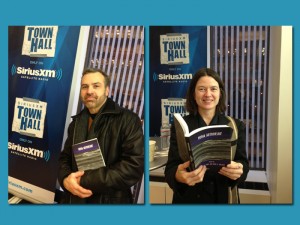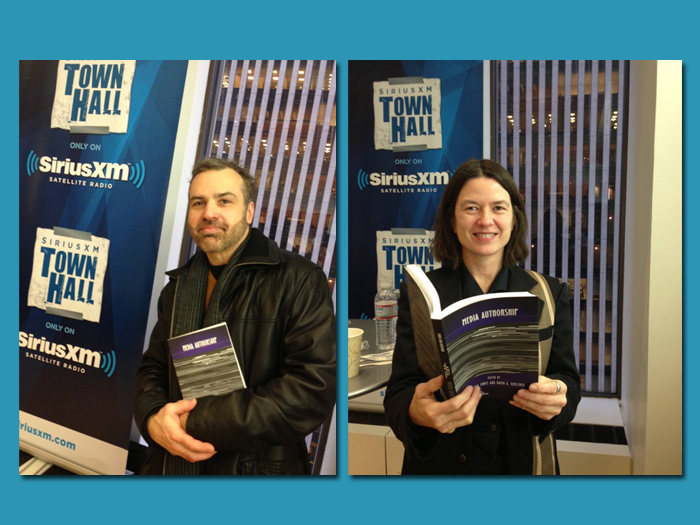
L-R: Professor of Cinema Studies Dr. David Gerstner and Associate Professor of Media Culture Dr. Cynthia Chris
CSI Professor of Cinema Studies Dr. David Gerstner and Associate Professor of Media Culture Dr. Cynthia Chris recently co-edited a book entitled, Media Authorship (Routledge, 2012). The book, compiled from an impressive list of several essays written by experts in the field focuses on the problems that forms of new media have caused with our ideas of authorship and how those ideas have been steadily shifting over the past few years.
Media Authorship is the 28th volume in the American Film Institute (AFI) Film Readers series. Dr. Chris explained that books in the series are “essential texts in film and media studies, widely assigned as course texts.”
This book in particular will be especially useful for those teaching about issues concerned with authorship practices (creative, legal, cultural, and so forth) with the new media technology. Due to the fact that Media Authorship contains new essays written specifically for these books, “they are also go-to publications for scholars in the field keeping up on the literature on any particular subject,” Dr. Chris notes.
In order to understand the idea or authorship in this world consisting of “new media,” it helps to understand just what that particular term means, which Dr. Chris discusses in the book. “New media is a tricky term,” cautions Dr. Chris. “All media were ‘new’ at one time or another. Radio as we know it, for example, as a broadcast medium, is less than a century old. Television, cinema, the phonograph, telephone, telegraph; even the printing press, which made possible the mechanical reproduction of the written word in the 15th century, were each at one point experimental novelties. For Media Authorship, we adopted the broadest possible definition of ‘media’, from cinema and visual art and textile design, to YouTube videos, blogs, and videogames; we focus primarily on contemporary practices, but our contributing authors situated their topics historically, too.”
The essays contained in the book also stress that authorship is a concept, “that is important to consider critically,” said Dr. Chris. “To author is to create.” It is important for an author to retain some measure of control of their work and to make sure that the works are protected by copyright for many reasons but none more evident than to dissuade others from copying the author’s work without permission.
The issue with new media is that many of these works are collaborative, Dr. Chris explains. For example, “Traditionally, we look to the director as the “author” of a film, even though someone else may have written the screenplay, which may be adapted from another medium, and countless others are responsible for aspects of the finished product, from casting and costuming to cinematography and visual effects.” At the same time, Dr. Gerstner tells us that “we found when matters of copyright were taken up by producers in Ghana or Aboriginals in Australia, the question of ‘ownership’ in a world that easily transmits information on a global level becomes all the more complicated.”
The authors of Media Authorship address the trend of media platforms becoming more interactive, providing opportunities for non-professionals to reach large audiences through blogging, vlogging, and no-budget feature films, to name a few.
As Dr. Chris says, “it may not be an overstatement to say that we are all authors now.” “With that said,” Dr. Gerstner reminds us, “issues of fair-use, distribution, and copyright ownership give pause to the idea that we are all liberated authors.”
Cynthia Chris is Associate Professor of Media Culture at the College of Staten Island, The City University of New York (CUNY). She is the author of Watching Wildlife and co-editor, with Sarah Banet-Weiser and Anthony Freitas, of Cable Visions: Television Beyond Broadcasting.
David A. Gerstner is Professor of Cinema Studies at The Graduate Center, CUNY, and the College of Staten Island. He is the author of Queer Pollen: White Seduction, Black Male Homosexuality, and the Cinematic and Manly Arts: Masculinity and Nation in Early American Cinema. He is also editor of The Routledge International Encyclopedia of Queer Culture, and co-editor with Janet Staiger of Authorship and Film.
















